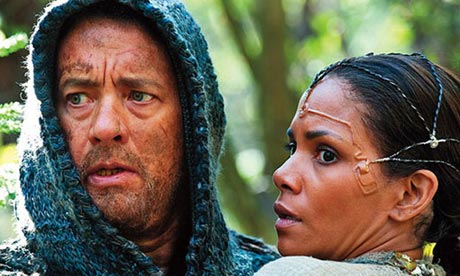Cloud Atlas - review
Tom Hanks sports a variety of noses and Hugh Grant gives us his best body-painted cannibal in this wildly over-reaching and not entirely unsuccessful adaptation of the David Mitchell novel

Suck on this ... Tom Hanks and minted Halle Berry in Cloud Atlas
- Cloud Atlas
- Production year: 2012
- Directors: Andy Wachowski, Tom Tykwer
- Cast: Halle Berry, Hugh Grant, Jim Broadbent, Tom Hanks
They tackle the complexity of the novel by introducing two innovations – one surprisingly deft and one absolutely daft. Mitchell's book is a compilation of six separate-but-linked short stories, which run consecutively and range from the troubled Pacific voyage of a 19th century abolitionist to the day-to-day struggles of a small tribe living on post-apocalyptic Hawaii. In between we call in on a genius 1930s composer, an investigative journalist digging into a conspiracy in the oil industry in 1970s California, a pompous book publisher trapped in a modern day nursing home, and a dystopian future where workers are farmed to supply the labour needs of a fast food chain. The three directors have carefully re-arranged the chronology, splicing between the stories based on theme. It's a daring shuffle, but it works. By zipping back and forth across the timeline they're emphasising Mitchell's original message – that the human experience is essentially universal across the ages.
Read the rest.
No comments:
Post a Comment